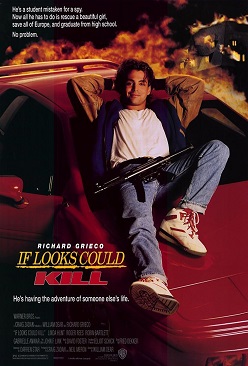Plot
Eighteen-year-old Michael Corben of Detroit, Michigan, is a handsome underachiever slacker. Rather than attending his high school French class, he spends all of his time drinking and partying, until graduation arrives, when all of his debauchery catches up to him and he learns that he cannot graduate without a French credit. He has only one more chance to obtain the credit: the French teacher, Mrs. Grober, and the French Club are headed to France for summer school, and Michael must accompany them and participate if he wants to graduate that year.
However, at the airport, a CIA agent also named Michael Corben, who is on his way to France as well, is killed by the assassin Ilsa Grunt, henchwoman and surrogate mother of the villainous Augustus Steranko who seeks to steal all of the gold in Europe and use it to mint his own coins under the guise of a common currency. Because important details about the agent's identity (including his actual age) have been kept meticulously secret, Michael is mistaken for the CIA agent. He is inexplicably boarded first class on his flight to Paris, and upon arrival is whisked away by British Intelligence.
The late Agent Corben's mission had been to protect Augustus Steranko, who (being not suspected to be evil) has been murdering European finance ministers as part of his plan. After some efforts to explain that he is not the Corben they think he is, Michael agrees to play along once it becomes apparent that he will be allowed to utilize high-tech gadgets, including X-ray glasses, exploding chewing gum and LA Gear sneakers with suction cups, as well as a Lotus Esprit. At first, he enjoys the perks of being a spy, but begins to rethink his decision once his life gets endangered by Steranko's deadly assassins, including Zigesfeld, a henchman with a prosthetic gold hand, and Areola Canasta, who kills her victims using her venomous pet scorpion.
In the meantime, Steranko captures Michael's teacher and classmates and holds them all hostage at his remote castle stronghold. Michael teams up with a girl his own age named Mariska—the daughter of Agent Blade, who was murdered by Steranko and his gang—to bring the villains down and save his friends as well as all of Europe's gold. Despite being briefly captured and imprisoned by Steranko's men, Michael escapes, rescues Mrs. Grober and his friends, and battles and defeats Zigesfeld.
Steranko, his duplicitous nature exposed by Michael, kidnaps Mariska and attempts to escape with his gold in his Eurocopter Ecureuil helicopter. Michael manages to rescue Mariska, and Steranko is subsequently killed when he falls out of the helicopter, and it and the onboard gold supply both drop on him. Afterwards, Mrs. Grober agrees to give Michael the French credit that he needs.
Production
The film was originally written by Fred Dekker as Teen Agent, the premise of which was to place a character akin to Anthony Michael Hall's characters from John Hughes' films into a James Bond type movie. [4] Dekker, who was only credited for the story in the released film, later stated that "The final product is not at all what I envisioned, not the least reason being they cast a 'cool' guy to play the nerdy lead, which kind of defeats the comedy." [4]
Principal photography began on April 16, 1990, and wrapped on July 4, 1990. The film was shot at various locations in Montreal and La Malbaie, Quebec, Canada. [1]
Reception
Box office
If Looks Could Kill made $2.2 million from 838 screens in its opening weekend, finishing 11th at the box office. [5] The film ultimately grossed over $7.7 million in North America. [3]
Critical response
On the review aggregator website Rotten Tomatoes , 29% of 7 critics' reviews are positive, with an average rating of 3.5/10. [6]
Stephen Holden of The New York Times stated, "The film's fatal flaw is the charmless performance of its star, who displays so little enthusiasm that in looking for signs of life […]. Mr. Grieco's problems can be blamed partly on the director, William Dear, who plunks him into some potentially funny situations but then leaves him stranded without a clue as to how to proceed." [7] Michael Wilmington of the Los Angeles Times opined, "Dear has a big, bright, bumptious style. He keeps the action lucid, the scenes popping. But If Looks Could Kill is a big, expensive cul-de-sac for him and everyone else: slick, quick, empty. It's another trailer-movie." [8]
Roger Ebert of Chicago Sun-Times gave the film 3 out of 4 stars; while he initially thought it a bad film, he eventually decided its over-the-top goofiness was intentional and saw it as a subversion of the spy film formula, rather than an incompetent ripoff. [9] Variety 's review wrote that it "spoofs the James Bond formula in tiresome fashion". [10] Rita Kempley of The Washington Post called it "insipid, tiresome and full of gross kids". She also criticized the violence, which she said was disturbing in a film marketed to the youth demographic. [11]
This page is based on this
Wikipedia article Text is available under the
CC BY-SA 4.0 license; additional terms may apply.
Images, videos and audio are available under their respective licenses.
